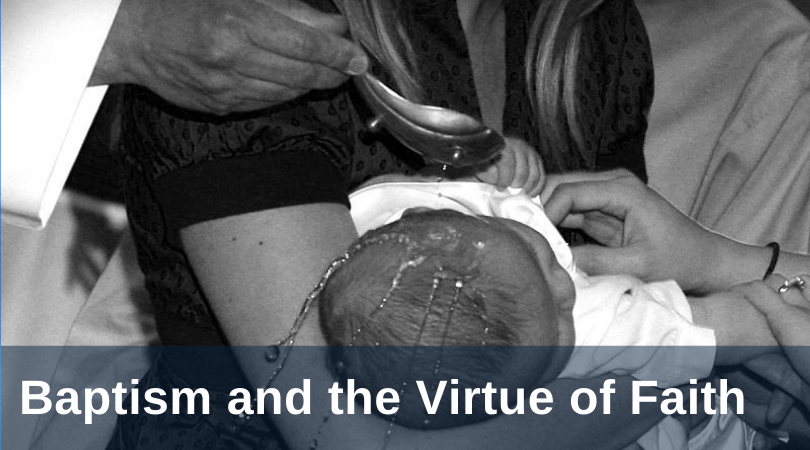
As a young girl, I always loved the Sundays when a Baptism took place in the context of the Mass. There were many reasons I found Baptisms captivating; for starters, they punctuated our usual Sunday routine with something out of the ordinary. But more than that, I was drawn up into the joy and the excitement of the sacrament. I loved seeing the little babies, water poured over them, oil lathered on their foreheads, their candles lit, the priest saying “________________, in the name of Christ, we welcome you into the Church,” and the choir singing, “Blessed be God, O blessed be God, who calls you by name, holy and chosen one.”
Baptism is our first source of sanctifying grace, enabling us to “persevere in the pursuit of the virtues” (CCC, §1811), to persist in forming within ourselves a habitual and firm disposition to do the good, thus becoming more like God. All of the sacraments are sources of grace, and grace is what allows us to grow in all of the virtues—both theological (faith, hope, love) and cardinal (prudence, justice, fortitude, temperance). Still, a particular virtue can still help us understand a particular sacrament, and conversely, a particular sacrament can help us cultivate a particular virtue. In a unique way, the virtue of faith is exemplified through Baptism.
Indeed, “Baptism is the sacrament of faith” (CCC, §1253). In fact, when the catechumen or the godparent is asked: ‘What do you ask of God's Church?’ the response is: ‘Faith.’ But then, what is faith? St. Paul writes that “faith is the realization of what is hoped for and evidence of things not seen” (Hebrews 11:1). It is by this virtue that we are able to “believe in God and believe all that he has revealed to us and that Holy Church proposes for our belief” (CCC, §1842). As Baptism is the foundation of the sacramental life, giving new life and transforming the person, so too does faith act as a foundational virtue for Christian moral virtue, likewise transforming and giving life to all other virtues so that they are oriented toward God.
There are many ways to nurture and cultivate this virtue. One way is to safeguard and take ownership of one’s faith by fulfilling the responsibility to be a witness to Christ. In a letter to her son on the night before his Baptism, one mother wrote,“We cannot hand [faith] to you as simply as we might wish. We can only plant a few seeds, step back, and pray for rain and good sun. Faith is the fruit of questions and confusion, of heartache and wondering, of hope and love. . . What your faith will be and where it will lead you is a mystery now. I can only pray that you will keep yourself open to that mystery as it unfolds.” The gift of faith, which we receive at Baptism, must be received, nurtured, and lived. Just as sacraments are external signs of grace, we are meant to become icons—visible signs—of the love of God. We are warned by Christ himself that our salvation is dependent upon this: “Everyone who acknowledges me before others I will acknowledge before my heavenly Father. But whoever denies me before others, I will deny before my heavenly Father” (Matthew 10:32). In the same way that the joy and signs of Baptism enamored me as a child and drew me deeper into the mystery, so too should our lives of faith be filled with joy and shown forth in actions that draw people closer to Christ.
Like what you read? Submit your email below to have our newest blogs delivered directly to your inbox each week.
Featured image by Joe Green; CC-BY-ND-2.0.


